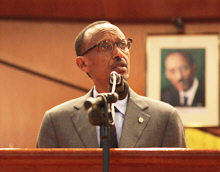
Typical street scene in Santa Ana, El Salvador. (Photo: iStock)
IMF Survey: Private Sector to Drive Africa's Growth, Bring Prosperity
March 23, 2012
- Legislators from 40 African countries met to discuss private sector–led growth
- Talks covered reforms to enable small businesses to flourish as growth engines
- Delegates agreed efforts, measures to improve Africa's business climate
The private sector will drive Africa’s economic growth and bring about the prosperity the continent’s people need and deserve, Rwanda’s President Paul Kagame told a conference of African legislators.

Rwanda’s President Kagame addresses African legislators in Kigali, calling for stronger intra-African cooperation, trade (photo: Mark Rabbage for IMF)
AFRICAN LEGISLATORS CONFERENCE
Opening the gathering of 120 parliamentarians from 40 African countries in Kigali, Rwanda, March 14, Kagame called for stronger intra-African cooperation and trade.
“There is no reason why we should be the world’s suppliers of cheap commodities and yet remain a vast market dependent on the outside world for most of our consumption goods,” Kagame told conference participants, who also included representatives of the private sector and civil society.
Addressing the role of parliamentarians, Kagame added that parliaments should develop “a modern and appropriate legal and institutional framework that meets the interest of business, employees and consumers in a fair, transparent and timely manner.”
The two-day conference was organized by the Parliamentary Network on the World Bank & International Monetary Fund, and hosted by the Rwandan government in its National Assembly complex. With the objective of bringing together parliamentarians, donors, private sector representatives, and government officials to discuss their respective roles in helping enable a conducive environment for private sector development, delegates also came together to learn from the Rwandan experience.
The landlocked country’s progress over the past decade includes measures to curb corruption, strengthen the rule of law, and reduce red tape. Sound economic policies ensured that Rwanda was one of the fastest-growing economies in the world, with economic growth averaging over 8 percent.
Decline in poverty
At the same time, poverty has declined as the share of the population living below the poverty line declined from 57 percent in 2005/06 to 45 percent in 2010/11. Economic growth and poverty reduction was accompanied by improvements in access to health services and, as a result, Rwanda will very likely meet and possibly even surpass targets set in the poverty-reducing Millennium Development Goals for child and maternal mortality by 2015.
To make further inroads in reducing poverty, the conference heard, Africa needs jobs, especially those created by a vibrant private sector; and parliamentarians are uniquely placed to ensure that the environment for business to flourish is adequate and conducive to investment.
IMF African Department Deputy Director Roger Nord noted that the conference was both timely and important: “It is timely, because with aid budgets under pressure, more than ever, the key to accelerating economic development in Africa lies in harnessing private sector–led growth. And it is important because the private sector is also the main source of future job creation— and Africa needs job-rich growth.”
Growth engines
During the conference, legislators discussed how they can boost macroeconomic stability by promoting legal and regulatory reforms. They also discussed the reforms needed to enable small and medium-sized enterprises to flourish as growth engines; and examined steps Africa’s parliaments can take to promote inclusive growth through sustainable private sector development.
Parliamentarians attending the conference included representatives from South Africa, Egypt, South Sudan, Kenya, Liberia, and Mozambique.
The conference allowed participants to discuss the main constraints to private sector development in the region and how they can help in their respective countries by ensuring through legislation and supervision of implementation that appropriate policies are being pursued. They agreed to step up efforts to improve the business environment on the continent by reviewing legislation linked to governance, trade barriers, and regional infrastructure.
Nord, in concluding remarks, highlighted that while Africa is on the move, continued growth requires investments in physical and human capital. “We need therefore to sustain public and private investments. Public investments require fiscal space and good public financial management. Private investments require good macroeconomic policies, strong legal and regulatory frameworks, and access to finance.”
Nord also emphasized that the IMF’s role extends well beyond financing, by highlighting the recently created regional technical assistance centers. By being easily accessible, these centers offer a preferred delivery vehicle for capacity building. “We are better prepared now to respond quickly to our clients’ needs in those areas,” Nord stated.
He noted that a recurring theme of the conference had been the importance of transparency, and lauded the role that legislators can play in the oversight and management of public expenditure and budgetary processes in their own countries.


